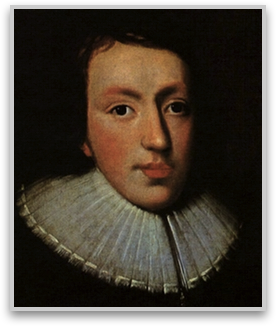
Paradise Lost Study Guide
Only John Milton could have written Paradise Lost, a poem that is a masterful depository of literary genius combined with expertise in classics, mythology, biblical literature, history, politics, philosophy, and theology.
Milton set before himself no small task, to "justify the ways of God to man," and he does so by taking the reader on an epic journey from the pits of hell to the throne of heaven. Milton's Satan is one of the greatest achievement of World Literature, his devilish rhetoric ensnaring our "first parents" as well as the reader.

Themes and Facts
- In addition to his undergraduate and graduate studies at Cambridge, Milton undertook a six-year self-directed course of study in a variety of subjects, including history, philosophy, theology, and science).
- Unlike many of his contemporaries, Milton could maintain close friendships across ideological divides.
- Though opposed to them theologically, Milton was a Puritan politically.
- Milton is noted for his theological heterodoxy as well as his poetic genius. In Paradise Lost, he makes the Son (Christ) subservient and unequal to the Father in substance, a denial of the doctrine of the Trinity.
- Paradise Lost is a model English epic poem, written completely in blank verse (unrhymed iambic pentameter).
- Paradise Lost is in some ways an apologetic, since Milton consciously sought to "justify the ways of God to man."
- Milton finished Paradise Lost while blind. He dictated the text to his daughters.
Study Questions
- For many readers, the question is what to do with the character of Satan. As the Norton anthology states, "nothing in the epic tradition or in biblical interpretation can prepare us for the Satan who hurtles into view in Book 1, with his awesome energy ad defiance, incredible fortitude, and, above all, magnificent rhetoric." Of course, the question then becomes - why? Why does Milton make Satan such an attractive figure initially?
- What changes to you notice in Satan physically as the poem progresses?
- What different strategies do the demons suggest for war against heaven?
- What are the differences between Adam and Eve as described by Milton? How is this different than the biblical account?
- What similarities do you notice in the respective descriptions of Satan and Christ?
- God is criticized by Satan for essentially being a bully. What evidence is there (aside from Satan's masterful rhetoric) to support this claim?
- How does Satan ultimately convince Eve to sin against God? Why does Adam choose to join Eve's rebellion?
John Milton's Paradise Lost is perhaps the single greatest poetic achievement in the English language, owing primarily to the grandiose figure of Satan, marked by his masterful rhetoric, inspiring presence, and devilish flair.